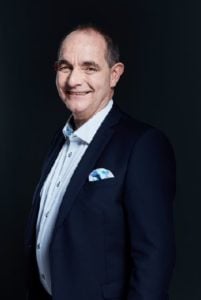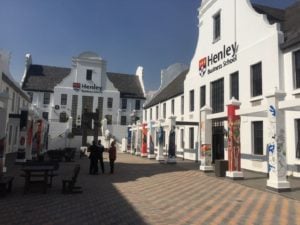Business schools bid farewell to their ‘viral virginity’
Business schools have lost their “viral virginity” and will never go back to working the way they did before Covid-19, says Jon Foster-Pedley, dean...
Jon Foster-Pedley is dean and director of Henley Business School, Africa and vicechair of SABSA. Jon has turned his wide-ranging skills and airforce focus to create a triple-accredited business education. Jon Foster-Pedley hails from England originally, born into an English family with deep aviation pedigree. His father, he tells me, was a pilot and a…
Jon Foster-Pedley is dean and director of Henley Business School, Africa and vicechair of SABSA. Jon has turned his wide-ranging skills and airforce focus to create a triple-accredited business education.
Jon Foster-Pedley hails from England originally, born into an English family with deep aviation pedigree. His father, he tells me, was a pilot and a war hero, and Jon followed in his footsteps when he won a scholarship to a

Jon Foster Pedley Dean and Director of Henley Business School Africa
military academy with the Royal Airforce where he too learnt to fly. After school, Jon found himself in London, in the swinging 60s, surrounded by hippies and artists – who provided stark contrast to his regulation hair style and demeanour.
Here, as a university student, he began to really explore his options as well as the nature of knowledge itself, and after a few years Jon decided to buy his way out of the air force, with plans to become a writer. “I never did,” he says,“ and I also felt I was a bit too much of a middle class bloke, so I did a number of jobs and travelled. I worked as a gardener, a chef, in civil service, as a driver. I did multiple jobs and it was very formative for me.” Still he found his way back to flying, through selling aircraft, aerobatic competitive flying, and flight instructing – a route that would ultimately bring him to South Africa for the first time in 1980.
Perhaps this is why he scoffs just a little when asked to sum up his career. “I’ve not had a career, I’ve just had a series of roles,” he laughs.
The gateway MBA
Back in the UK, one of Jon’s bosses offered to sponsor his MBA at Ashridge Business School which would ultimately go on to shape his life as much as flying. “I loved it,” he says. “Suddenly my brain was flowing. I loved the studies. Earlier I’d been very much seeking life rather than seeking studies, but I’ve always been reasonably capable, but now it was like coming home. It was the right time for me, and I dived into it.”
Immediately after the MBA, I moved out of sales into organisational development which is a psychology area, and started teaching strategy part-time with a South African born complexity theorist called Ralph Stacey,” he
continues. This led to developing a business school for the European aerospace industry, and his own deep dive into strategy. “I’ve always been fascinated by the difference between being an expert in strategy and an
expert strategist. They’re quite different things.
He joined Airbus and other leading European aerospace companies in France as a marketing director in a joint venture, and headed up education development while continuing to teach. In 1994, after five years in France, Jon looked again at South Africa where democracy was just dawning.
“The offer I took was running strategy program for the MBA at the University of Cape Town, and very quickly I had the opportunity to design and set up an executive MBA. This was a progressive MBA based on systems-thinking and complexity theory – a higher level of complexity than you would encounter in a normal MBA. I designed and ran that, and loved it.”
Henley beckons
After a few years in various education roles, arose the opportunity – and challenge – of becoming dean and director of Henley Business School South Africa. Henley, Jon explains, had been in South Africa for 20-odd
years, but remained very small with a handful of staff, and an MBA. “I had the opportunity to maybe make something of it, and again, it was like coming home. I was building a business. We were given no financial support by anyone, and we were paying off historic debts. We were paying off to our parent university, and still are.” But the prospects were clear to him: having the chance to create from conception, underpinned by all his learnings and experience.
Jon says he did a lot of thinking about what would be the best model to build a university business school, based on ethics and relevance, as well as reframing what Africa meant. “Our intellects, the capabilities of people in Africa are way up there. What we don’t necessarily have is experience, as well the business cultural training and exposure. We needed to find a way to address that.”
“Our intellects, the capabilities of people in Africa are way up there.”
A growth story.
Under his leadership, Henley has grown exponentially, from five to 75 staff and grown revenue by nearly 1000%. “We’ve tripled the MBA intake,” he says. “We now supply 65-70% of all MBA students of our parent university, Reading. We’ve got the largest MBA scholarship program in Africa, for sure, one of the largest in the world with about 30 MBA scholarships which we fund totally ourselves. ” He is understandably proud of their schools international triple accreditation, as well as their “blind-assessed” results, comparing their students to those at other international schools. Furthermore, under his leadership Henley has transformed significantly. “We’re now 70% black, with 52-55% women on the MBA. And 80% black, with 55% women or more on our other programmes.”
Additionally, they set up an NGO called MBAid which is working with 350 NGOs now.

Henley Business School – Africa
Service in the industry
This service ideal is something that Jon walks in his own life too, serving as vicechair of the South African Business Schools Association (SABSA). The SABSA mission and values – centred on growth, transformation, and leadership – are well aligned to Jon’s own values and those of Henley’s too, and he calls it a privilege to serve here. “I’m also on committees for the European Foundation of Management Development, the Global Business School Network. I’m on the board of the British Chamber of Commerce, am chairman of the MBAid NGO which adds social impact to the activities of business schools, and vice-chairman of the South African Business Schools Association”
Purpose for people
Jon believes their success is due to being purpose-driven, and unique. “It struck me that the only purpose of the business school in our context is to reduce the GINI coefficient ( a measure of inequality). So we build people, who build the businesses, that build Africa. If [graduates from Henley] are not better at that, at starting a business, better at using money, and developing their capabilities, then we haven’t done our job.” He adds: “It’s not about slapping a qualification on somebody. We have to give people confidence. We don’t hype them, they have to learn how smart they are. “Having a purpose means that we’ve had to attract really good people, so we’ve really worked on quality and design, and we have a 0% competitive orientation.”
“We’re a business school that is dedicated to the prosperity of our lives and the thriving of our lives through making good businesses and good institutions.”
This means, he says, that they do not try to compete with other business schools. Instead, they look at impact on inequality, and the lives of graduates. They value creativity, innovation, and ethics, promoting corporate activism, and taking a strong stance on corporate corruption. “Corruption can’t happen without corporate collusion. The trouble is the corporates aren’t colluding out of evil, quite often they’re colluding because they’re believing in a poor system. The poor system is that everyone must make profits. So we’re not a business school of science making profits. We’re a business school that is dedicated to the prosperity of our lives and the thriving of our lives through making good businesses and good institutions.
Recently, Jon was featured in a Dean & Director profile series by South African Business Schools Association (SABSA). Read the full profile here.
Business schools have lost their “viral virginity” and will never go back to working the way they did before Covid-19, says Jon Foster-Pedley, dean...
Nigel Casey, Henley Business School South Africa British High Commissioner to South Africa, talks to our Dean, Jonathon Foster-Pedley and shares...
In a recent webinar Jon Foster-Pedley of Henley Business School shared insights on an HR focused panel
Be the first to know about new our latest newsletter insights